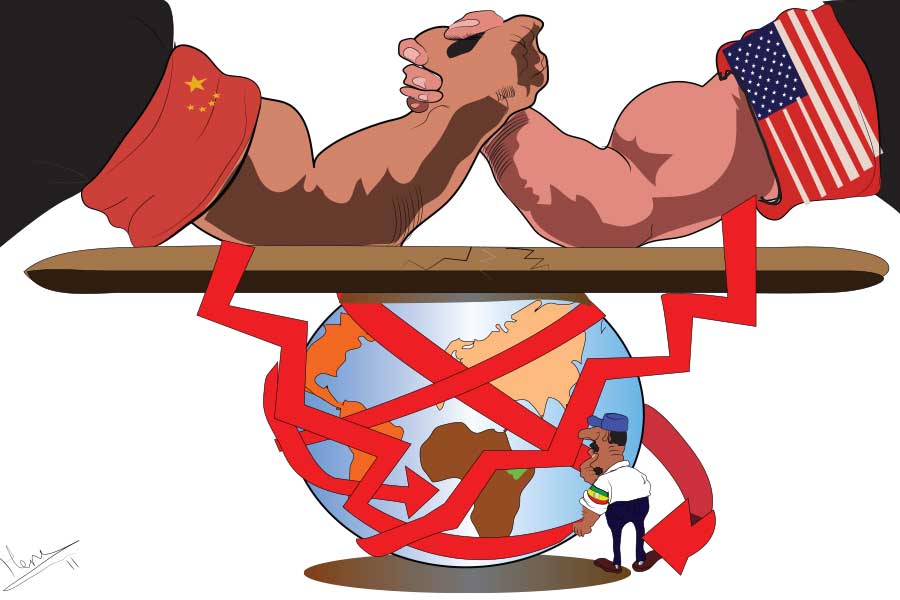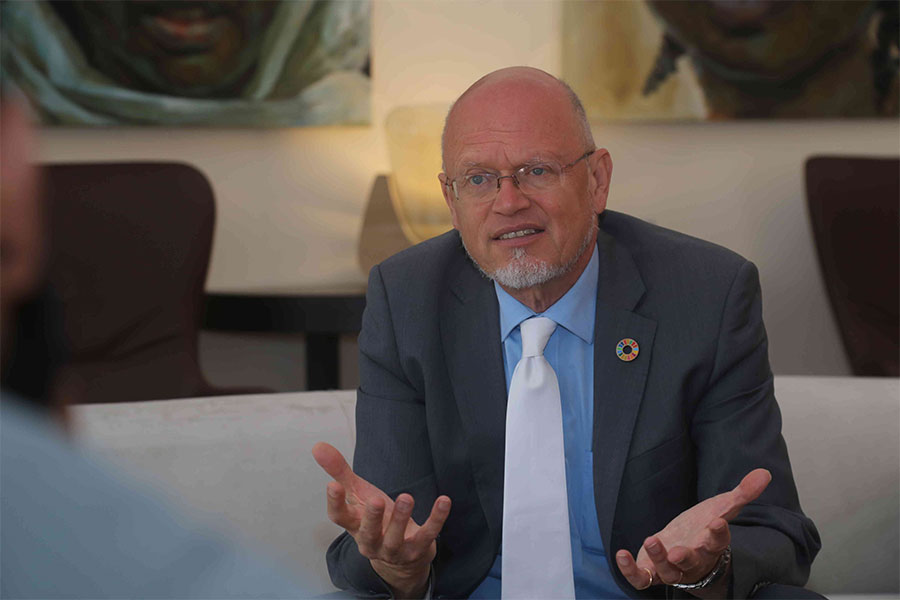
Fortune News | Mar 16,2020
Feb 11 , 2023
By Gene Frieda
Investors typically view the US Dollar's exchange rate through a Federal Reserve-centric lens.
Yet while the Fed's aggressive rate-hiking cycle clearly worked in the Dollar's favour last year; the greenback owed its hyperbolic 25pc appreciation primarily to inflation and geopolitical shocks. Hence, as fears of inflation and uncontained military conflict have abated, the dollar has begun to weaken, offering much-needed financial relief to emerging-market economies and reducing pressure on other central banks to tighten policy.
Through most of last year, investors ran for cover amid a rare confluence of shocks that reduced economic growth and simultaneously boosted inflation. With monetary policy much more volatile than normal, as well as highly correlated across developed economies (reflected in sharp interest-rate hikes almost everywhere), volatility rose in fixed income, foreign exchange, and equity markets, and the dollar – as the world's primary reserve currency – prevailed as a safe haven.
Moreover, while the Fed played the leading role in setting the timing and magnitude of rate hikes, a series of independent shocks hurt growth in Asia and Europe. Thanks to its own energy independence and geographic distance from these shocks, the US economy was better insulated than most.
Europe faced the existential threat of losing access to its primary energy source. In sentiment surveys, confidence indicators fell far more than economic indicators did, reflecting an additional risk premium on European assets. Many worried about the tail risks of Russian energy supplies being severed altogether or – worse – of a nuclear event. The Russia-Ukraine war also triggered an energy terms-of-trade shock, leading to a rebalancing of demand as hydrocarbon importers in Asia and Europe sought new suppliers, including in the US.
Policies within key countries also bolstered the dollar.
Until December last year, China had enforced its zero-COVID policy, creating an independent negative demand shock both within its borders and the region. And the United Kingdom offered its own special contribution to peak dollar demand with its September-October budget debacle, which made Liz Truss the shortest-serving prime minister in British history and temporarily dragged down the Euro.
What should we expect next for the Dollar?
Evidence from the past 30-plus years suggests that when inflation is not a major source of uncertainty on its own, the Dollar does not tend to peak until the US economy is in recession. The Fed's reaction to that recession has gained traction within the risk-asset component of the financial system.
By contrast, Dollar peaks came earlier when the Fed hiked interest rates in the 1970s and early 1980s. Back then, high inflation was the main risk to growth and the primary source of policy and market uncertainty. When inflation began to fall, uncertainties in policy growth both abated. The market eventually regained its confidence in the Fed's ability to ease policy to counteract recession risks without sacrificing its commitment to low and stable inflation.
As inflation recedes, growth expectations will tend to improve, uncertainty will fall, and so, too, should the Dollar.
After benefiting from the rapid pace of cumulative rate hikes on the way up, the Dollar is now likely to suffer as the US leads the world in bringing inflation back down, because the Fed's behaviour tends to govern the pace of rate movements elsewhere. As the Fed nears a pause – or even a possible end – to policy tightening, all other central banks will be poised to slow down and eventually pause as well. That will lure investors out of their Dollar safe havens and back into riskier assets. The Dollar is likely to offer relatively high-interest yields in absolute terms, but that yield status is set to shrink in 2023 as the market prices out some of the increases that occurred last year.
In terms of relative growth momentum, the US has not slowed as sharply as its peers, largely because it has had less proximity to the shocks mentioned above. But this dynamic should now work in reverse in 2023, barring some new exogenous shock or a substantial spillover from the war in Ukraine.
China's downward growth revisions and subsequent foreign-exchange underperformance were a clear drag on forex markets more broadly. The end of the zero-COVID policy, at least to the extent the exit strategy succeeds, could be an important source of downward pressure on the Dollar. Coupled with a rebound in Chinese growth expectations, currencies in Asia and Europe will become plausible beneficiaries from a US economy characterized by slowing growth and continuing inflation.
Of course, there is always a risk of new and unexpected shocks. But unless and until they arise, Dollar depreciation should continue as the uncertainty surrounding inflation and monetary-policy volatility declines. For the rest of the world, Dollar depreciation is the cheapest form of stimulus available. It is good news for global growth – as long as it lasts.
PUBLISHED ON
Feb 11,2023 [ VOL
23 , NO
1189]


Fortune News | Mar 16,2020

Commentaries | May 21,2022

Viewpoints | Oct 12,2024

Commentaries | Oct 07,2023

Viewpoints | Dec 09,2023

Editorial | Aug 24,2019

Radar | May 16,2020

Viewpoints | Jun 18,2022

Exclusive Interviews | Apr 15,2023

Viewpoints | Oct 28,2023

Photo Gallery | 176946 Views | May 06,2019

Photo Gallery | 167163 Views | Apr 26,2019

Photo Gallery | 157739 Views | Oct 06,2021

My Opinion | 136938 Views | Aug 14,2021

Dec 22 , 2024 . By TIZITA SHEWAFERAW
Charged with transforming colossal state-owned enterprises into modern and competitiv...

Aug 18 , 2024 . By AKSAH ITALO
Although predictable Yonas Zerihun's job in the ride-hailing service is not immune to...

Jul 28 , 2024 . By TIZITA SHEWAFERAW
Unhabitual, perhaps too many, Samuel Gebreyohannes, 38, used to occasionally enjoy a couple of beers at breakfast. However, he recently swit...

Jul 13 , 2024 . By AKSAH ITALO
Investors who rely on tractors, trucks, and field vehicles for commuting, transporting commodities, and f...

Oct 18 , 2025
The political establishment, notably the ruling party and its top brass, has become p...

Oct 11 , 2025
Ladislas Farago, a roving Associated Press (AP) correspondent, arrived in Ethiopia in...

Oct 4 , 2025
Eyob Tekalegn (PhD) had been in the Governor's chair for only weeks when, on Septembe...

Sep 27 , 2025
Four years into an experiment with “shock therapy” in education, the national moo...

Oct 18 , 2025 . By NAHOM AYELE
In a sweeping reform that upends nearly a decade of uniform health insurance contribu...

A bill that could transform the nutritional state sits in a limbo, even as the countr...

Oct 18 , 2025 . By SURAFEL MULUGETA
A long-planned directive to curb carbon emissions from fossil-fuel-powered vehicles h...

Oct 18 , 2025 . By BEZAWIT HULUAGER
Transaction advisors working with companies that hold over a quarter of a billion Bir...